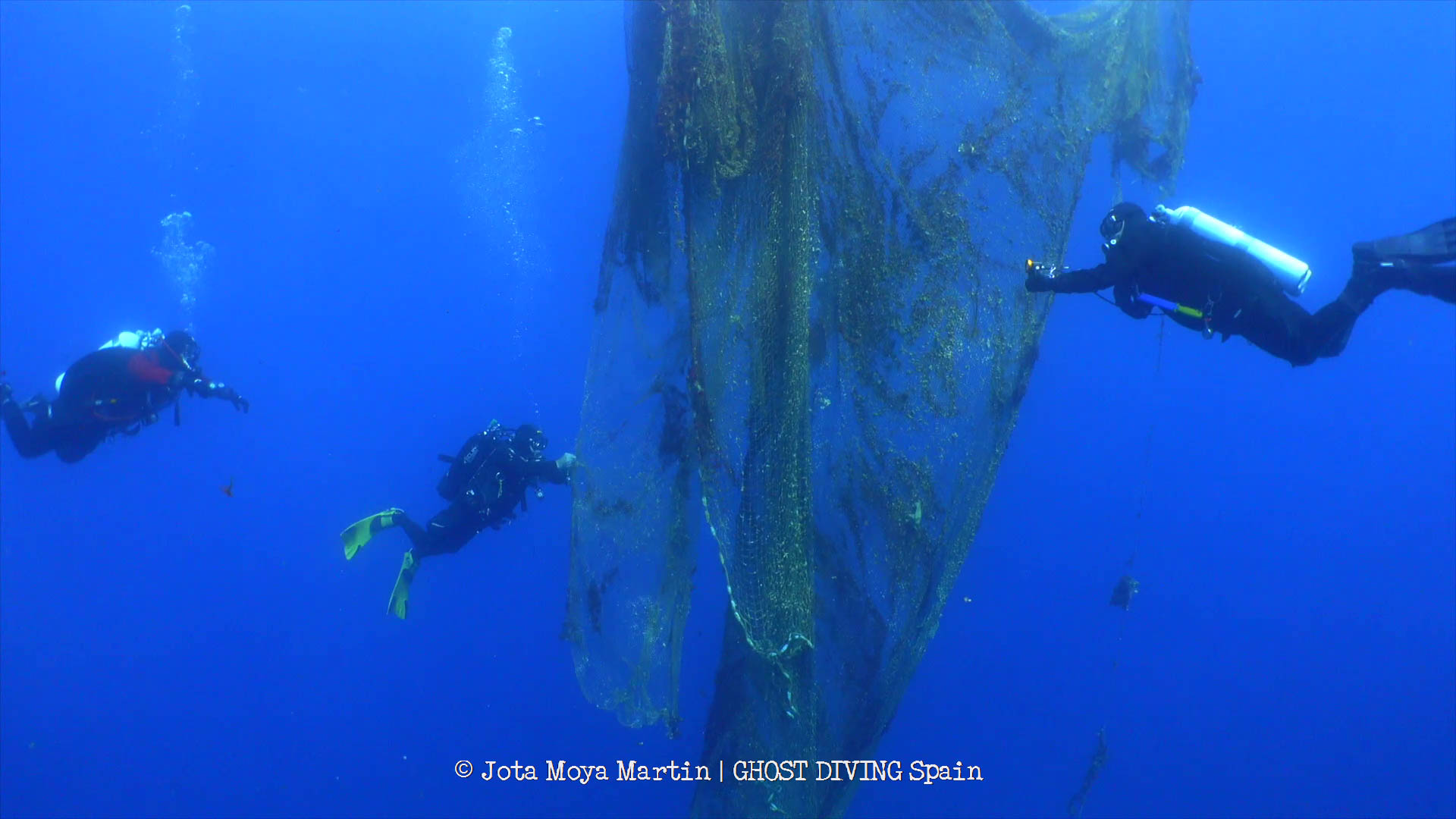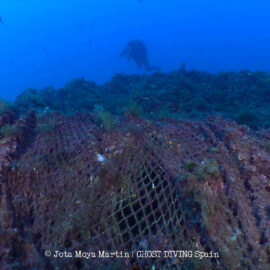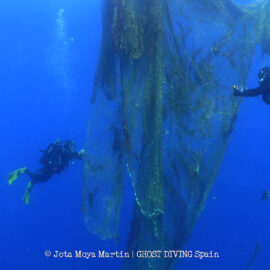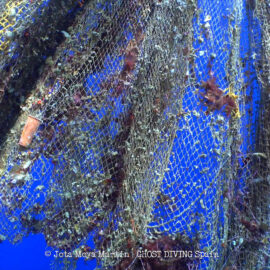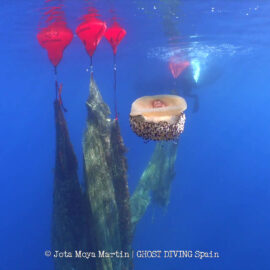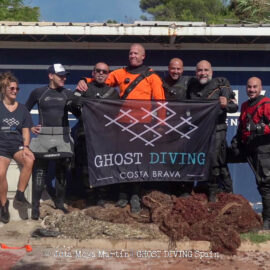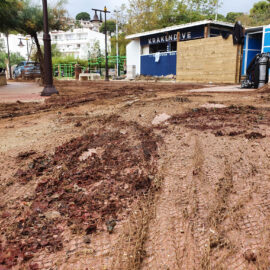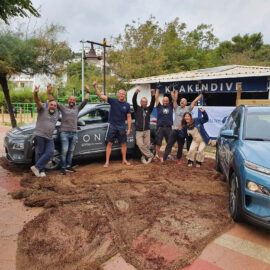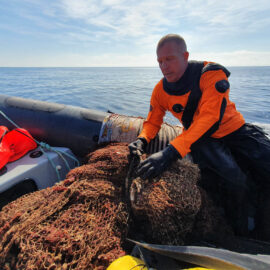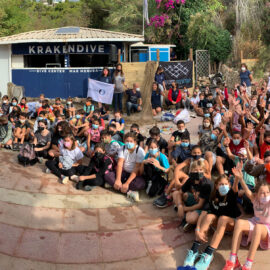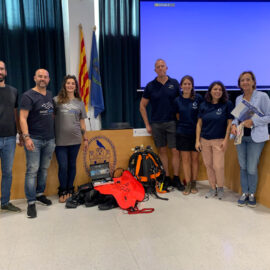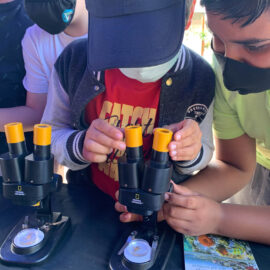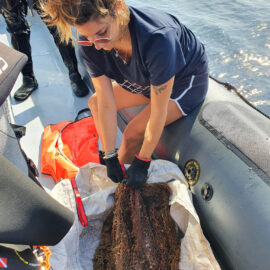Healthy Seas, together with Ghost Diving Spain, organised an event from October 1-3 in Tossa de Mar. The volunteer diving team has been operating since 2014 and recently started a cooperation with Healthy Seas, recording ten sea cleanup projects together over the past few months.
On October 1st, a conference at Tossa Del Mar City Council kicked-off the event followed by an educational programme that involved 120 students from the local school ‘Escola Pública Ignasi Melé i Farré’ in collaboration with Xatrac, a local environmental association.
The children participated in a beach cleanup, interactive presentations and games, to raise awareness about the ghost fishing phenomenon that is responsible for the suffering and death of millions of marine animals. They are called “ghost nets” because they appear almost invisible underwater, continuing to catch and kill without human involvement. It is estimated that 640,000 tons of fishing gear are lost or abandoned annually in the world’s seas and oceans.
In the following days, eight volunteer divers carried out underwater cleanups at “Muladera Rock” near Tossa de Mar. The team discovered and removed a fishing net that was covering the reef like a thick blanket, preventing marine life from accessing food and shelter in its holes and crevices.
Coinciding with scientific studies that indicate that the sea surrounding Barcelona is one of the three areas in Spain most polluted with plastics from fishing activity[1], Raúl Alvarez, coordinator of Ghost Diving Spain says “For years, divers have observed nets and other fishing equipment polluting this popular diving spot. We are excited to be able to help clean up this area to allow biodiversity to thrive again.”
Once on land, it was time to clean the large fishing net that covered an area of 100 m₂ and weighed 450 kgs. Divers removed thirty kilograms of lead which they will upcycle into weights for their diving belts.
“We are proud to have expanded our activities to Spain and be able to support local efforts in order to heal and protect the environmentally burdened coasts and seas of this beautiful country” says Veronika Mikos, Healthy Seas Director.
The event was also made possible thanks to Hyundai Motor Europe that announced its partnership with Healthy Seas back in April. They are providing funding for the implementation of Healthy Seas cleanup and education activities.
Healthy Seas is a best practice example for circular economy and will ensure that the recovered nets will become a new resource. The nylon parts will be regenerated by Aquafil, together with other nylon waste, into ECONYL® yarn, the basis for new sustainable products such as swimwear, activewear, socks and carpets.
Notes to Editors:
The mission of the ‘Healthy Seas, a Journey from Waste to Wear’ initiative is to remove waste from the seas, in particular fishing nets, for the purpose of creating healthier seas and recycling marine litter into textile products. The recovered fishing nets will be transformed and regenerated by Aquafil, together with other nylon waste, into ECONYL® yarn, a high-quality raw material used to create new products, such as socks, swimwear, sportswear or carpets. Since its founding in 2013, Healthy Seas has collected over 585 tons of fishing nets with the help of volunteer divers and fishermen.
About Ghost Diving
Ghost Diving is an international non-profit organization of volunteer technical divers specialized in the removal of lost fishing gear and other marine debris since 2009.
To this day, the Ghost Diving team has carried out diving projects independently or in collaboration with several international environmental and/or diving organizations like: Healthy Seas Foundation, Greenpeace, WWF, Global Ghost Gear Initiative and Global Underwater Explorers.
Contact:
Jenny Ioannou
Communications Manager
Email: [email protected]
Tel.: +30 6974992349
[1] M.A. Martín-Lara, V. Godoy, L. Quesada, E.J. Lozano, M. Calero,
Environmental status of marine plastic pollution in Spain,
Marine Pollution Bulletin,
Volume 170,
2021,
112677,
ISSN 0025-326X,
https://doi.org/10.1016/j.marpolbul.2021.112677.
(https://www.sciencedirect.com/science/article/pii/S0025326X21007116)
Abstract: The excessive use of plastic in our society is causing a massive accumulation, since it is a non-biodegradable product and with still poor recycling rates. This effect can be observed in the seas, which more and more plastic waste are accumulating. The present work is a critical review, based on all currently available literature, that reports environmental status of marine plastic pollution, especially microplastic pollution, in Spain. The three Spanish water areas with the highest presence of plastics are the Alboran Sea, the Gulf of Alicante and the vicinity of Barcelona probably related to fishing and industrial activities and high population densities.



